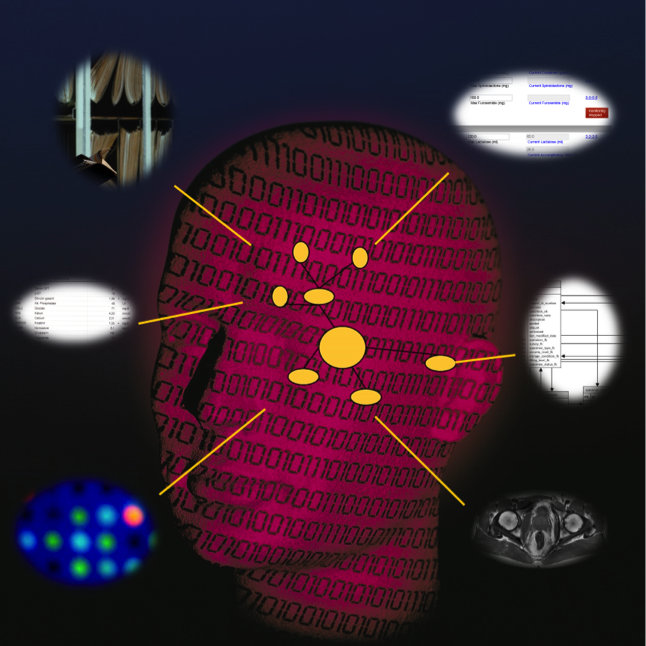
XplOit – Research to automate the Prediction of Disease Progression
BMBF has started a project to support and strengthen research on software-based forecasts, individualized treatment of disease processes, and applications in transplantation medicine
Individualized mathematical/systems medical models for the development of disease processes have the potential to predict future health events and individual therapy outcomes. Such predictive models can assist clinicians in diagnosing and treating their patients, and help patients to better understand their diseases. In order to develop a mathematical prediction model, a large range of varied clinical patient data must be gathered from information systems, curated, and extensively analyzed. Privacy must be ensured when dealing with personal and sensitive patient information. The complex predictive models obtained from analysis of the data must first be checked in elaborate clinical trials in terms of their prediction accuracy before they can be used in practice. Previously, this has been achieved by only a few models.
The BMBF project “XplOit” will facilitate and accelerate the complex process of preparing and combining clinical data, of model development and validation, as well for making it available for clinical use. This should be possible with a new generation of advanced so-called semantic data integration and information extraction tools, which are integrated with a modeling workbench in an IT platform.

© Fraunhofer IBMT, MEV Verlag
The “XplOit” platform is initially designed for the development and validation of predictive models to improve treatment after stem cell transplantation. The transplantation of hematopoietic stem cells from donors, for example, is used for the treatment of various forms of leukemia. Life-threatening complications can occur, such as viral infections or graft-versus-host reactions. Even disease relapses are often seen. At present, it is not yet possible to predict with high accuracy in which patients these complications will occur, and life-saving measures are often introduced too late. Using the “XplOit” platform, precise forecast models will be developed individually for each patient to predict possible complications, and to prevent them through timely clinical intervention or counteracting them at an early stage.
Launched in March 2016 and designed to run for 5 years, the collaborative project “XplOit” is implemented by an experienced international, multidisciplinary team of experts from the fields of medicine, systems biology, computational linguistics, and medical and bioinformatics. It is coordinated by the Fraunhofer Institute for Biomedical Engineering IBMT, which also holds the lead in development of the “XplOit” platform, and contributes core components for extracting information, integration, and analysis. The Institute for Formal Ontology and Medical Information Science at the University of Saarland is mainly responsible for the so-called Semantic Integration Framework platform. The company Averbis develops tools for the extraction of information from clinical text documents. Computer scientists from the Department of Pediatric Oncology and Hematology of the University of Saarland are in charge of data protection and develop anonymizing tools and parts of the modeling workbench system.
The modeling itself is done by the Max Planck Institute for Computer Science and the Department of Clinical Pharmacy of the University of Saarland. Clinical expertise and data are represented by the Department of Internal Medicine I — oncology, hematology, clinical immunology, rheumatology and the Institute of Virology at the University of Saarland, as well as by the Department of Bone Marrow Transplantation and the Institute of Virology at the University Hospital Essen. The clinical partners will validate the predictive models for stem cell transplantation developed through coordination by the Institute of Virology at the University of Saarland using the “XplOit” platform.
A basic version of the “Xploit” platform will be ready in autumn 2018 from the University Hospital and model developers. First prototype predictive models for stem cell transplantation medicine are expected in early 2019. XplOit is funded under the initiative i:DSem — Integrative Data Semantics in Systems Medicine funded by the Federal Ministry of Education and Research.
Duration: 01.03.2016 – 28.02.2021
Contact person(s):
Dr.-Ing. Gabriele Weiler / Dipl.-Inform. Stephan Kiefer
Projektkoordinatoren XplOit
Fraunhofer-Institut für Biomedizinische Technik IBMT
Joseph-von-Fraunhofer-Weg 1
66280 Sulzbach
Germany
Phone:+49 6894/980-156
E-Mail: gabriele.weiler(Replace this parenthesis with the @ sign)ibmt.fraunhofer.de / stephan.kiefer(Replace this parenthesis with the @ sign)ibmt.fraunhofer.de
Project partners:
Fraunhofer-Institut für Biomedizinische Technik IBMT, St. Ingbert (Koordinator)
Universität des Saarlandes
Max-Planck-Institut für Informatik, Saarbrücken
Universitätsklinikum Essen
Averbis GmbH, Freiburg

